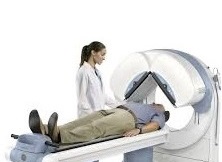Nuclear Medicine

What is nuclear medicine?
Nuclear Medicine involves the intravenous injection or oral administration of a small amount of radioactive material.
This material travels to various organs in the body depending on its chemical composition. The camera then creates an image of the organ in question. AMI employs dual-detector nuclear medicine cameras. These cameras, the only outpatient cameras of their kind in the area, allow both sides of the body to be scanned simultaneously. This can reduce the time the patient has to be on the table by up to 50%, translating into greater patient comfort and more accurate scans.
Types of nuclear medicine
Bone or joint scan
The reason for this test is to find out if there are any abnormal areas within the bones or joints. A small amount of radioactive material is injected into the vein, which is then taken up by the bony skeleton. Pictures are taken 2 to 3 hours after the injection. Sometimes it is necessary to take plain radiographs (x-rays) of the bones in order to further evaluate any abnormal areas. The radioactive material will leave the body through the urine.
Gallium Scan
The reason for this test is to detect infection or tumor. Pictures are taken with a special camera. Depending on your medical history, imaging will either be at 24, 48 or 96 hours after the injection of a radioactive material. The patient may need to take an enema to better evaluate the abdomen. The radioactive material will leave the body through the urine.
Hepatobiliary Scan
The reason for this test is to evaluate gall bladder function and to assess the bile ducts. The patient is injected with a radioactive material and then pictures are immediately taken with a special camera for a minimum of one hour and possibly up to three hours.
Liver or Spleen Scan
The reason for this test is to find out the size and function of the liver and spleen. A small amount of radioactive material is injected into the vein. Pictures of the liver and spleen are taken. The radioactive material will leave the body through the urine.
Muga Scan
This tests evaluates the function of the heart and is often done on patients who will be receiving chemotherapy. The patient has a small amount of blood drawn which is then mixed with the radioisotope. This mixture is then re injected into the patient and imaging begins about 10 minutes later. The test takes about one hour.
Renal Scan
The reason for this test is to assess the blood flow as well as the level of function of the kidneys. A small amount of radioactive material is injected into the vein. Pictures are taken right after the injection. A computer is used to calculate the amount of blood flow and function of each kidney. Pictures are taken for a period of 30 minutes. The radioactive material will leave the body through the urine.
Spect Liver Scan
This test is often done as a follow up to a CT Scan, MRI or Ultrasound to rule out a benign liver tumor (hemangioma). This is a 2 part test. The first part will take 1/2 hour. The technologist will draw a small amount of blood from the patient and mix the isotope with it. The blood is then re-injected into the patient. The patient may then leave but must return approximately 1 1/2 hours later for imaging. The images will take 45 minutes.
Thyroid Scan and uptake
This examination determines how well the thyroid gland is functioning by measuring the uptake of iodine by the thyroid gland. In addition, pictures of the thyroid gland are obtained. The test is performed over the course of two days. On the first day, you will be given a radioactive iodine pill and then be asked to return in six hours for the first uptake determination as well as pictures of the gland. On the second day, you will be asked to return for a 24 hour iodine uptake measurement. At this time, the radiologist will review your test and may decide to examine your thyroid gland. Additional pictures of the gland may be obtained by the radiologist after review of the study and the physical examination. The radioactive iodine will be cleared by your kidneys in the urine. Since the iodine may also be excreted in breast milk, it is advised that breast feeding be discontinued for at least 48 hours after the examination.

